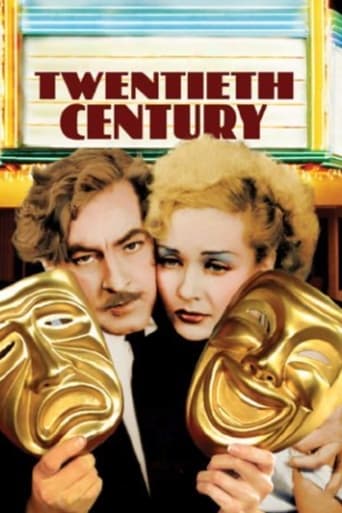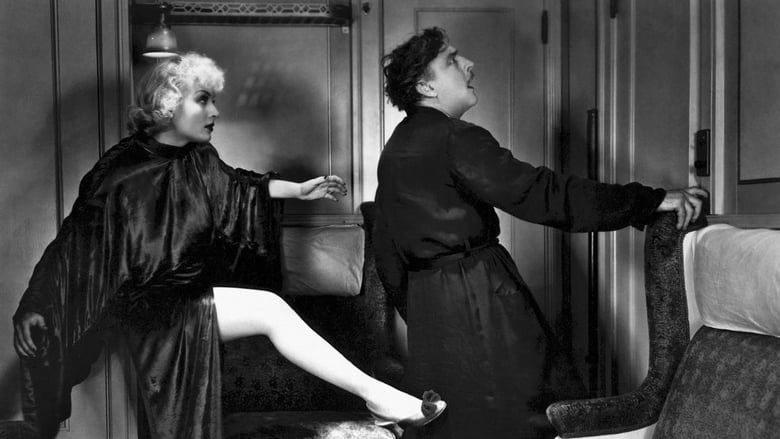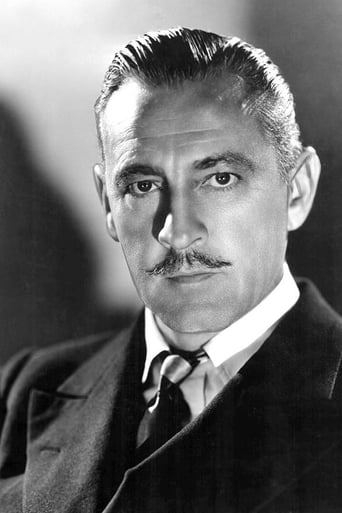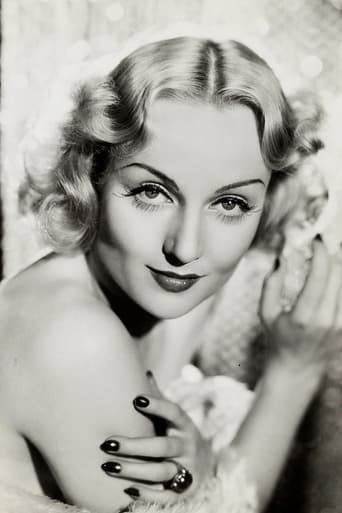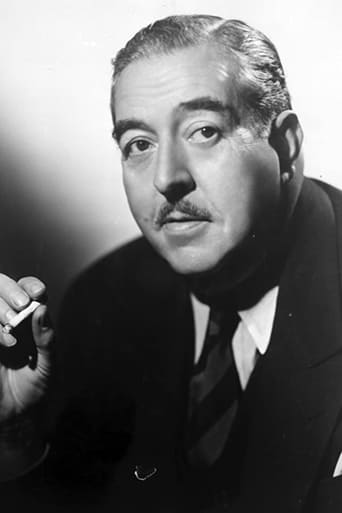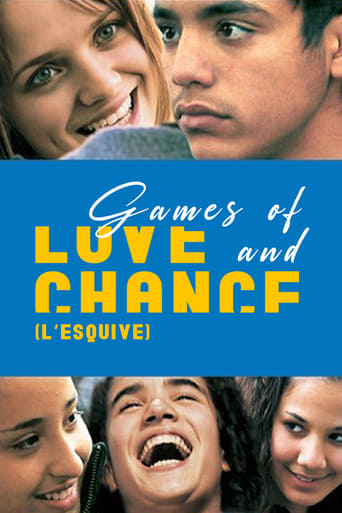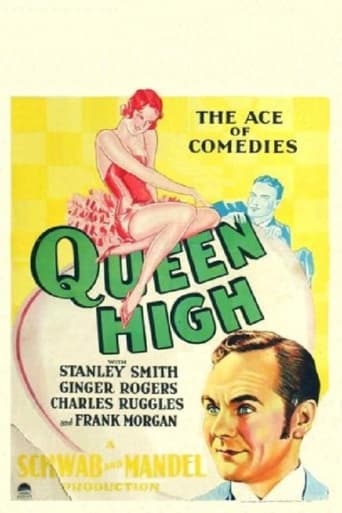Twentieth Century (1934)
A temperamental Broadway producer trains an untutored actress, but when she becomes a star, she proves a match for him.
Watch Trailer
Cast


Similar titles
Reviews
Overrated and overhyped
Good story, Not enough for a whole film
A film with more than the usual spoiler issues. Talking about it in any detail feels akin to handing you a gift-wrapped present and saying, "I hope you like it -- It's a thriller about a diabolical secret experiment."
The story, direction, characters, and writing/dialogue is akin to taking a tranquilizer shot to the neck, but everything else was so well done.
It would be hard to come up with a better cast than this for "Twentieth Century." The cast was perfect for the plot and script of this hilarious comedy. And this is one film that clearly fits the category of "screwball." It starts off slowly, but after the opening scenes it turns into a riotous farce with one crazy scene after another. John Barrymore excels as stage producer Oscar Jaffe. Carole Lombard is wonderful as Mildred Plotka whom Jaffe makes into the star, Lily Garland. Walter Connolly and Roscoe Karns are the ideal supporting cast for the mad and hilarious genius Jaffe – as Oliver Webb and Owen O'Malley. All others of the cast give top performances.No one could play an intentionally hammy role or scene better than John Barrymore. One scene in particular must have cracked up the cast, and I'd wager that it had to be shot a few times. Oliver and Jaffe's secretary are standing in the room when the private eye Jaffe hired to trail Lily (Oscar McGonigle played by Edgar Kennedy) tells him that Lily has boarded a train for Hollywood. Jaffe says, "She has left me," and he feigns an attack of some sort. He swaggers slowly, staggering from side to side as he makes his way out of the room. He seems as though he may fall at any moment. The others stand there watching. Not a word is said for what seems like an eternity. He lumbers slowly through the doorway, and puts his right hand on the doorjamb as if to steady himself. He disappears around the door, but his hand is clasped against the wall – not grabbing or holding onto the doorframe, but lying flat against the wall. The whole focus is on his hand against the wall at center stage. It was a wonderful interlude for laughter by us viewers so that we wouldn't miss any dialog. What a hilarious, hammy scene!More hilarity is added to the film with some new characters and little side plots on the train. Barrymore's changing moods and manners are the things that show the great talent of this actor. But Lombard showed her talent as well in her temperament swings on the train. Overall this is one fantastically funny film. Yet, it didn't receive any awards, or even nominations. The year 1934 was a big one for the Academy Awards. A full dozen films were nominated for Best Picture – then, it was called "outstanding production." That was the year when comedy reigned supreme at the Oscars, with "It Happened One Night" winning top honors. For many years, it was the only film in history to have won the top five Academy Awards -- for best picture, best director, best screenplay, best actor and best actress. Clark Gable won as best actor for that film, but there were only three nominees for best actor. I don't know what kind of politics may have been at play back then, but I can't see how John Barrymore did not at least receive a nomination for best actor for "Twentieth Century." Here is a sampling of funny lines from this wonderful film. Oscar Jaffe to Lily Garland: "Just wait, dear. You're in America now, don't you know? The Old South does not yodel."Jaffe: "Oliver, did you hear that? She's left me." Oliver: "Say the word, O.J., and I'll kill myself." Owen to Oliver: "He won't kill himself. It'd please too many people."Jaffe: "I never thought I should sink so low as to become an actor." Lily: "Well, I showed him. Right on top of the ladder and going up."Jaffe: "I wouldn't take that woman back if she and I were the last people in the world, and the future of the human race depended on it."Jaffe: "Where's Oliver?" Owen: "You fired him." Jaffe: "Oh, he's taking advantage of that, is he?"Jaffe to conductor: "There's a law in this country about riding on trains." Conductor: "What?" Jaffe: "I want you to enforce it. Stop the train."Lily to George: "Who cares about your respect? I'm too big to be respected."Jaffe: "Get Oliver with that contract." Owen: "I'll do my best sire, but we've crossed the river and I've lost the scent."Lily: "What do you want, scorpion?" Jaffe: "If it makes you any happier to call me names, go ahead."Jaffe: "When I love a woman, I'm an Oriental. It never goes. It never dies." Lily: "Phooey!"Jaffe: "I don't want him (the sultan of Turkey), you fool. I want his dervishes, the whirling ones."Jaffe: "That's the final irony. Killed by a lunatic."Jaffe: "She loves me. I could tell it through that screaming."
Here is yet another classic film that, up to now, I have never seen. John Barrymore was not noted for his comic performances, yet he is so damn funny here your sides ache from laughing. Carole Lombard had her first great comic performance in this laugh-a-minute film, which highlights the love-hate relationship between a Broadway producer and his greatest female star. There are also some great character people in this, like Walter Connely and Charles Lane, billed here as Charles Levison. This comedy is based on a stage play, but the dialouge goes by so fast that you hardly notice this fact. This film is considered by many to be the first "screwball" comedy. It was made for a depression-era audience, yet it's comedy resonates well today. A must-see.
Roscoe Karns: "Who was it that said it's always darkest before the dawn?"John Barrymore: "I don't know who it was, but he was an ass."This is pretty much the tone of "Twentieth Century", an hilarious comedy which features Barrymore in his best comedic role, as megalomaniac theater producer Oscar Jaffe, and his equally egotistical protégé, Lily Garland, played by the lovely Carole Lombard.Cynical, sarcastic humor that Ben Hecht was quite adept at.The "Twentieth Century" refers to the train that is taking Lombard to Hollywood to make movies, after her success on Broadway due to the efforts of Oscar Jaffe, consummate ham.Barrymore, who was already drinking himself to death, gives a fine, over-the-top performance. Unlike later films, where he sadly burlesqued himself.Carole Lombard is a jewel. Her greatness was that she could look beautiful and be terribly funny at the same time. Not many actresses accomplish this, but as far as I'm concerned, she is the quintessential screwball comedy actress.The script pokes big holes in the vanity of stardom, and there is an awful lot of satire about religion included.The cast is excellent, with reliably sanguine Walter Connolly, goofy Roscoe Karns, slow-burn par excellence Edgar Kennedy and the forever old Charles Lane.I enjoy this film, as well as "Nothing Sacred" more than "My Man Godfrey". They are all three fine films, but "Nothing Sacred" and "Twentieth Century" make me laugh out loud.It's fun stuff!
John Barrymore appears on screen under an ostensibly ego-centric persona. It's Oscar Jaffe's Oscar Jaffe by Oscar Jaffe in the Oscar Jaffe theater, so it's suffice to say he thinks highly of his craft... until he meets his match with Lily Garland (once Mildred Plotka), a tender actress who just wants to act and shows passion in one moment of desperation that floors him. But Barrymore takes this character, and the subsequent ups and downs (mostly eccentric and crazy downs) he has with Carole Lombard and makes it something special. He claws his fingers and widens his eyes and curves and does maniacal things with his eyebrows, sometimes carrying a cane or a black cloak or at "the end of his rope" with a gun. He's like Count Dracula, Norma Desmond and a villain out of a comic-book all rolled into one devilishly clever and diabolical and wonderfully nutty package.This also means that Howard Hawks's film, a very good if not great comedy on the theater biz and BIG personalities that feed off one another whether they love it or despite it, gets a boost from Barrymore's performance. Make that a BIG boost, so much so that even Carole Lombard, who isn't any kind of slow-poke as far as whipping from one over-the-top emotion or another, can't keep up with how incredible a performance it is. It fills up the screen in every frame and almost threatens to come off the screen and take a few audience members as hostages. Oscar Jaffe is called everything from a phony and fake to a weasel and horror, more or less, and it's all deserved. But one thing he isn't is disingenuous, which makes him always compelling on screen. Some of his actions on the train of the movie's title goes almost TOO far, which is part of the point and some of Hawks's brilliance here.Trying to edge it back and it wouldn't work, and go any further (which sometimes, like the argument scene with the kicking from Lombard) and it goes into feverish melodrama. As it stands Hawks controls his stars just enough, and gets some inspired bits from supporting players like the guy compulsively posting stickers everywhere on the train and writing bad checks, and at worst it's maybe a bit stagy. At best it's inspired and genre-defining lunacy where all you can do at the end is roll your eyes at the characters' shenanigans and know they deserve each other. Which works for us, since we wouldn't want it any other way.

